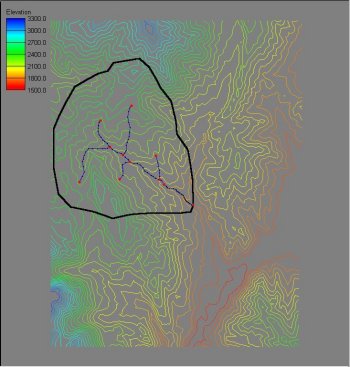WMS:Quick Tour - Conceptual Model: Difference between revisions
From XMS Wiki
Jump to navigationJump to search
No edit summary |
No edit summary |
||
| (4 intermediate revisions by the same user not shown) | |||
| Line 1: | Line 1: | ||
[[Image:wmsquicktour.jpg]] | [[Image:wmsquicktour.jpg]] | ||
A conceptual model of the area | A conceptual model of the area the watershed exists in is created using a bounding polygon to define the limits of the area and stream arcs to identify the important channel data. The bounding polygon does not need to represent the actual watershed boundary; this will be determined later. The conceptual model will act like a "cookie cutter" in stamping out the region of the elevation data inside the polygon and then enforce the stream lines as triangle edges. | ||
[[Image:tin2.jpg]] | [[Image:tin2.jpg]] | ||
| Line 7: | Line 7: | ||
[[WMS:Quick Tour - TINs| '''< Previous''']] | [[WMS:Quick Tour - Creating the TIN| ''' Next >''']] | [[WMS:Quick Tour - TINs| '''< Previous''']] | [[WMS:Quick Tour - Creating the TIN| ''' Next >''']] | ||
{{WMSQuick}} | |||
[[Category:WMS Quick Tour|Conceptual]] | |||
[[Category:WMS Map]] | |||
Latest revision as of 15:49, 11 April 2017
A conceptual model of the area the watershed exists in is created using a bounding polygon to define the limits of the area and stream arcs to identify the important channel data. The bounding polygon does not need to represent the actual watershed boundary; this will be determined later. The conceptual model will act like a "cookie cutter" in stamping out the region of the elevation data inside the polygon and then enforce the stream lines as triangle edges.


